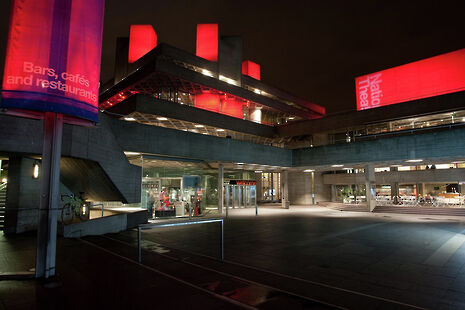Playground: The National Theatre
Charlotte Taylor considers the National’s success over the last 50 years and wonders what lessons it can teach us

The National Theatre, a by-word for theatrical excellence, celebrated its 50th anniversary earlier this month to commemorate what it has done best for the past half century: produce and import quality products no matter how uncommercial they sound, and use new methods such as physical theatre to illuminate the themes of the play, creating a production that can serve as a reflection of our times.
The National Theatre has a far greater responsibility than any other theatre company in Britain: being our national theatre, it has to walk the line between providing a high quality service, and catering to the public’s wants and desires.
In order to do this, the theatre embodies the belief that people understand and respond to quality, not just performances staged purely to entertain.
The National Theatre has consistently advocated originality, and has since become the benchmark against which all other British theatre, including our own theatre scene in Cambridge must measure up.
Here in Cambridge, Michaelmas term has produced its usual show of quality. It has seen an acclaimed production of The History Boys, as well as The Bacchae, a tragedy by Euripides which was updated to serve as a reflection of our times.
Even if the latter production did feel like a somewhat contrived modernisation, the innovative spirit is to be applauded. In future, I hope to see more shows which place a greater emphasis on illuminating the script rather than modernising it simply for the sake of it.
Jez Butterworth’s epic play Jerusalem also took to the ADC stage to reflect the condition of Britain amidst the erosion of rural ways of life – and to great success.
Perhaps more experimentally, Shoot Coward! took three Latin American plays that had not even been shown in Britain before and staged them in the Corpus Playroom – a move as daring as any done at the National Theatre.
It is this willingness to try something novel, and produce it with creativity and finesse, which I hope to see more of in the Cambridge theatre scene.
In spite of its initial resistance to the National Theatre, British theatre has been well served by it, given its willingness to adapt and look abroad for inspiration, as well as accept the literary shifts and attitudes in Britain.
The Cambridge theatre scene has perhaps emulated the National Theatre’s ideals in its willingness to experiment with unknown plays from other cultures, aided in part by its diverse student body and its large international student intake.
Nevertheless, the student productions of the day might continue to better themselves by examining whether the staging of their productions are mere aesthetic, or add meaning to their texts.
 News / Downing investigates ‘mysterious’ underground burial vault 29 December 2025
News / Downing investigates ‘mysterious’ underground burial vault 29 December 2025 News / Unions protest handling of redundancies at Epidemiology Unit30 December 2025
News / Unions protest handling of redundancies at Epidemiology Unit30 December 2025 Lifestyle / Ask Auntie Alice29 December 2025
Lifestyle / Ask Auntie Alice29 December 2025 Features / ‘Treated like we’re incompetent’: ents officers on college micromanagement30 December 2025
Features / ‘Treated like we’re incompetent’: ents officers on college micromanagement30 December 2025 Science / Astronomical events to look out for over the break29 December 2025
Science / Astronomical events to look out for over the break29 December 2025









